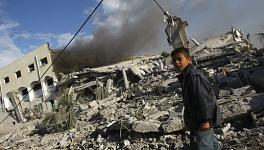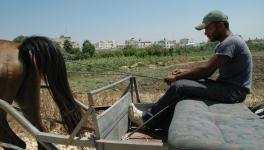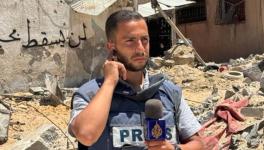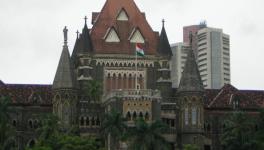The Gaza Truce: A New Strategic Balance in the Region
Despite the many claims by Israel of having taken out Hamas military infrastructure, 80 rockets were fired even on the eighth day of the conflict, showing that Hamas arsenal had by no means been depleted. On the last day, the bombing of a bus in Tel Aviv, the first after 2006, showed a widening of the conflict.
The Egyptian sponsored ceasefire, finally accepted by Israel, is reported to have split the Israeli cabinet, with Ministers such as Avigdor Lieberman pressing for a ground offensive instead. Finally, under US pressure and promise of more money for the Iron Dome missile system did the Israeli cabinet fall in line.
The cease-fire makes clear that Israel will also have to give up its self given right of targeted assassinations in Gaza. This was the key Gaza demand – that not only there should be a ceasefire, but Israel should not in future conduct targeted assassinations – the cause of this round of hostilities. The ceasefire agreement reads, “Israel shall stop all hostilities in the Gaza Strip land sea and air, including incursions and targeting of individuals.”
Secondly, Israel had also to accept, “Opening the crossings and facilitating the movement of people and transfer of goods and refraining from restricting residents' free movements and targeting residents in border areas.” This has been a key demand of the Palestinians and has always been rejected out of hand, with Israel saying that this can be discussed only if Hamas disarm and this disarming can be verified. Another way of saying no. While the “Procedures of implementation” of such border openings including “transfer of goods” would be discussed after 24 hours of ceasefire taking effect, lifting the blockade is now on the table, something the Palestinians have not been able to force Israel to discuss over the last 6 years.
Finally, Israel now has to deal with Egypt as the arbiter of the ceasefire agreement and not the US. This makes it a completely different ball game. Till now, it is the US which has led the quartet and its travesty of peace efforts in Palestine. For Israel to accept that Egypt is now the new “peacemaker” in the region and with active endorsement of the US and its Secretary of State in Cairo, changes the regional strategic balance.
It also shows that there is now a new emerging equation in the region. The US and other NATO countries are willing to deal with Muslim Brotherhood and try and co-opt them in its regional architecture. Mursi and the Egyptian Brotherhood also need US support – for IMF loans and other financial deals for Egypt. They may therefore be willing not to rock the Israeli boat too much. The problem here is not the intentions of the Brotherhood but the pressure that will be on them with the return of mass politics in Egypt. How much “nice” he can do with Israel will also depend on the temper of the Egyptian people. It is this pressure that forced Mursi to actively intervene in Gaza.
The strategic balance changing in the region is also clear from the isolation that Gaza had in the 2008-2009 war and this time. Arab League, Tunisian government, the Turkish government all lined up with Mursi to seek a ceasefire. The US also was clear a ground invasion in Gaza would upset the new alignment that they have built up with Muslim Brotherhood and similar forces against Iran and Syria. And the gains would have been only a limited loss of the military strength of the Hamas which would have been as easily repaired as last time, if not faster.
One of the aims of the US and its allies have been to divide the Arab world in Sunni and Shia terms, and therefore isolate Iran, Hezbollah and Syria. This has partially succeeded with even the Hamas, who had been head-quartered in Syria, leaving it for other Arab capitals. Initially, the Hamas leader Khaled Meshaal mentioned only the Egypt, Arab League and other forces for their solidarity, carefully leaving out Iran and Syria. Interestingly, in his speech after the ceasefire, he did mention Iran and its support though again leaving out Syria.
Balance of Terror
The Eight-Day war clearly showed that the balance of terror between Israel and Hamas have not changed. Israel is able to assassinate at will its leaders, launch military strikes on Gaza but cannot prevent rockets from reaching Israel's populated areas. For the first time after the Iraq War og 1991, rockets landed on Tel Aviv and Jerusalem. And if the Iranian statements are correct, Palestinians have learnt to manufacture longer range and more sophisticated rockets – they are not being supplied from Iran as Israel claims.
A ground offensive would have been too costly in terms of civilian lives lost and would still have not achieved beyond what was achieved last time. Israel can enter Gaza, destroy civilian infrastructure, kill a lot of people but cannot break the will of the people to resist, even if the one-sided resistance produces far higher losses for them. For the Palestinians in Gaza, under a blockade for the last 5 years, accepting that Israel has a right to kill anybody, any time in Gaza without any response, is to accept being written out of history.
Israel seems to have believed that the Iron Dome system would protect them against all rocket attacks. What the Gaza 2012 war shows is that if the Israeli defences have improved, so has the ability of the Hamas and other forces in Gaza to launch attacks. With 5 killed and estimated 300 injured (including those in shock, who in estimates for Gaza are not counted as injured), Israel cannot act with complete impunity against Gaza. Israel can try and take out the Hamas, but only if it is prepared to reoccupy Gaza, an option that is no longer open to it. Even its closest allies, the UK and the US had to caution Israel against any ground offensive, not because of any sympathy for Gaza population, but because public opinion would then turn against Israel even more.
The Iron Dome has been touted as a big success. Even countries like India are now talking about buying such a system. So how effective was it?
By Israeli estimates, it was successful in shooting down 80-85% of missiles it targeted. To put things in perspective, it is important to note that the bulk of Gaza's rockets are made from “fertilisers” read donkey’s shit and sugar. These are the home-made Qassam rockets, with a range of 15 KM's. The Katyusha or Grad rockets with a range of 20-40 Km are also manufactured in Gaza, with some components imported through the tunnels linking Gaza with Egypt. Finally, the Fajr 5, with capability of striking up to 75 K, bringing Tel Aviv within its range, which Israel claims have been imported from Iran, but Iran claims only to have supplied the technology. In addition, there was also the fear this time that Hamas have shoulder-fired anti-aircraft missiles, the reason why attack helicopters have not been employed in Gaza this time.
Even with an active blockade, Hamas and other groups in Gaza could replenish their rocket arsenal and could penetrate the Iron Dome shield enough to cause damage. For them, the effectiveness of such rocketry has little military significance. What matters is whether their rockets manufactured with such primitive technology can still penetrate Israeli defences and survive military strikes and blockades As long this continues, the balance of terror will continue in Gaza. And the Iron Dome has not managed to change this equation.
All in all, Israel has technologically upped its capacity with drones, improved ability to strike its targets and supposedly better intelligence. The civilian casualties however – 37 children and more than a dozen women killed – shows that very little has changed from last time. And all this ability to strike at Gaza's military targets and intercept its rockets have not succeeded in changing the character of this balance of terror – its citizens get lasting peace only if sits down and negotiates peace. Not through beating Gaza's population into submission, however brutal the beating.
There has been enough written about how Israel's claims of self-defence is bogus. Any serious analysis of when lulls are broken in Gaza would show that in more than 90% of the cases, it is Israel that has broken such de facto cease-fires, either through military strikes or targeted assassinations. If they had a serious desire for stopping rocket attacks, all they had to do is to implement the cease-fire with Hamas. Israel wanted the rocket attacks from Gaza to continue as this gives the far right the opportunity to say that Palestinians do not want peace and also to maintain the illegal blockade. For Hamas , there is very little option. If Israel assassinates key figures in its leadership, or launches missile strikes on Gaza, they have to respond. Otherwise, the Hamas would have to make away for other forces there.
Why This War?
Why did Israel assassinate Al Jabari, the Hamas military head in Gaza, knowing full well that Hamas would have to respond? And why did they ratchet up the military strikes to a full-blown war on Gaza, with the further threat of a ground offensive?
There is wide-spread belief that Israel routinely uses Palestinian bodies for ballots in its elections. The 2008 attack on Gaza was also at a similar time – a few weeks before the elections. This time elections is only 8 weeks away in Israel. While this may be a partial explanation, this is not enough in the high stake game that any attack of this magnitude involves, particularly as there was every possibility of things spinning out of control.
There seems to be two other reasons why Israel went in for the limited Gaza offensive. One is to de-rail the possible peace talks that Obama in his second term might have insisted. Time is running out of a possible two-state solution, if it has not already run out. With an escalation of this magnitude, Netanyahu gambled that any peace offensive would be dead before it even starts. The second was the need to divert the attention of the world away from Palestine Authority's move for recognition in the United Nations, which though would not give it full membership rights but would still make it possible for Palestine Authority to bring Israel to the International Court of Justice for war crimes.
For such a gamble to succeed, Netanyahu needed that the Israeli strategic dominance over Gaza should be strengthened – he should be able to claim a decisive victory over Gaza. The Hamas military objective was much more limited – all they needed to demonstrate was that they were still standing – they needed to be still fighting till the ceasefire. This they did succeed. Israel has therefore failed in its strategic objective in starting the 2012 War.
Is it just another meaningless truce which will unravel sooner rather than later or does this signify a long range shift in the Arab world and its relations with Israel? I believe that this marks a significant shift in the strategic balance in the region and Israel has overreached itself. The net gainers have been the Hamas, Muslim Brotherhood and Egypt; the losers are Israel and Mahmoud Abbas, who has been effectively sidelined.
Get the latest reports & analysis with people's perspective on Protests, movements & deep analytical videos, discussions of the current affairs in your Telegram app. Subscribe to NewsClick's Telegram channel & get Real-Time updates on stories, as they get published on our website.
























